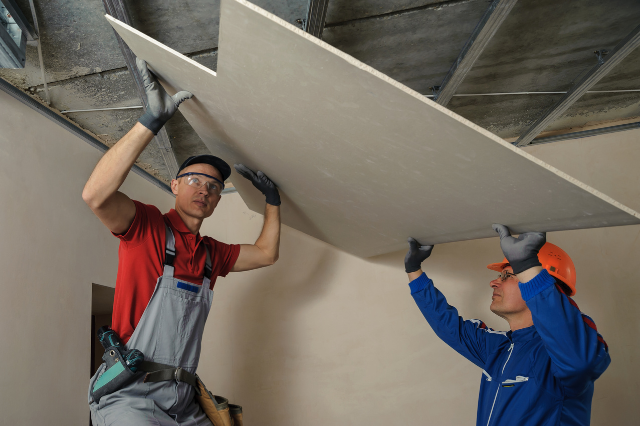Drywall Installation Costs Explained: What to Expect for Your Next Project

Drywall installation is a crucial step in finishing a home’s interior, providing the smooth, sturdy walls that create the backdrop for every room. Whether you’re building new construction or renovating, understanding the cost of drywall installation can help you budget more effectively and avoid surprises. Here, we’ll break down the key factors that influence drywall costs, providing estimated figures to help you plan for your next project with confidence.
1. Average Cost of Drywall Installation
The cost of drywall installation can vary significantly based on several factors, but on average, homeowners can expect to pay between $1.50 to $3.50 per square foot for materials and labor. This estimate includes both the cost of the drywall sheets and the associated installation expenses. For a typical 1,000-square-foot area, the total costs can range from $1,500 to $3,500, depending on the specifics of the project.
2. Factors Influencing Drywall Installation Costs
Understanding the factors that influence drywall installation costs is key to getting an accurate estimate. Here are some of the primary considerations:
a. Material Type
The type of drywall you choose will significantly impact the cost. Standard drywall typically costs about $0.40 to $0.65 per square foot. If you opt for specialty types, such as moisture-resistant drywall (used in bathrooms) or fire-resistant drywall (commonly used in garages), prices can increase to $0.80 to $1.50 per square foot. The choice of material also affects durability, aesthetics, and the wall’s overall functionality.
b. Project Size
The overall size of your project will also affect the total cost. Larger projects often have a lower per-square-foot cost due to economies of scale. For instance, installing drywall in a 1,500-square-foot home may cost between $2,250 and $5,250, while smaller projects might have a higher per-square-foot cost. It’s important to consider the dimensions and layout of your space to estimate materials accurately.
c. Labor Costs
Labor costs for drywall installation typically range from $30 to $70 per hour. Factors such as local labor rates, project complexity, and the experience level of the contractor can influence these rates. On average, labor can account for 50% to 70% of the total installation cost. Hiring experienced professionals can save time and ensure a quality finish, reducing the likelihood of costly mistakes.
3. Additional Costs to Consider
While the base cost of drywall installation is essential to understand, several additional expenses can impact your overall budget:
- Framing and Preparation: If your walls require framing or preparation, such as insulation installation, expect to pay extra. Framing costs typically range from $1.00 to $3.00 per linear foot. Proper framing is crucial for structural integrity and for supporting the drywall.
- Finishing: Taping, mudding, and sanding drywall joints are crucial for achieving a smooth finish. Finishing costs can add another $0.50 to $1.50 per square foot to your project. This step is essential to ensure a seamless look, especially if you plan to paint afterward.
- Painting: If you plan to paint after installation, factor in additional costs. Painting can cost around $2.00 to $6.00 per square foot, depending on the quality of paint and complexity of the job. The choice of color and finish can also affect your overall budget.
- Removing Old Drywall: If you’re renovating and need to remove existing drywall, expect to pay approximately $1.00 to $2.00 per square foot for removal and disposal. This is an important step to ensure that your new installation is done correctly and efficiently.
4. Estimating Total Costs
To give you a clearer picture, let’s estimate the total cost for a typical drywall installation project. For a 1,000-square-foot area:
- Material Costs: Approximately $400 to $650
- Labor Costs: Approximately $600 to $1,200
- Finishing Costs: Approximately $500 to $1,500
Total Estimated Cost: Between $1,500 and $3,350 for the complete project. These estimates can help you gauge your budget more accurately, ensuring you set aside enough funds for the entire project.
Conclusion
Understanding the costs associated with drywall installation Orlando is essential for effective budgeting, whether you’re embarking on a small renovation or a larger construction project. By considering material types, project size, labor rates, and additional costs, you can arrive at a more accurate estimate tailored to your needs.
To ensure the best results, it’s advisable to consult with experienced drywall contractors who can provide detailed estimates based on your specific project. With proper planning and a clear understanding of costs, you can achieve a beautiful, functional space that meets your design vision without breaking the bank.






